LST5CCL Company & Commercial Law: Consumer Rights Case Study
VerifiedAdded on 2023/06/12
|5
|1214
|121
Case Study
AI Summary
This case study examines consumer guarantees and manufacturer liability under Australian Consumer Law (ACL) using a scenario involving contaminated melons. It analyzes the rights of consumers Jocelyn and Arjun who suffered harm due to the contaminated melons manufactured by R’Us. The analysis covers sections of the ACL related to acceptable quality, safety, and manufacturer's liability for defective products. It argues that R’Us is liable to compensate both consumers for medical expenses, lost income, and other consequential damages. Furthermore, the study discusses additional risks like tort of negligence and breach of implied contractual terms, reinforcing R’Us's responsibility to ensure product safety and compensate for damages caused by their negligence and breach of contract. Desklib offers similar solved assignments and past papers for students.
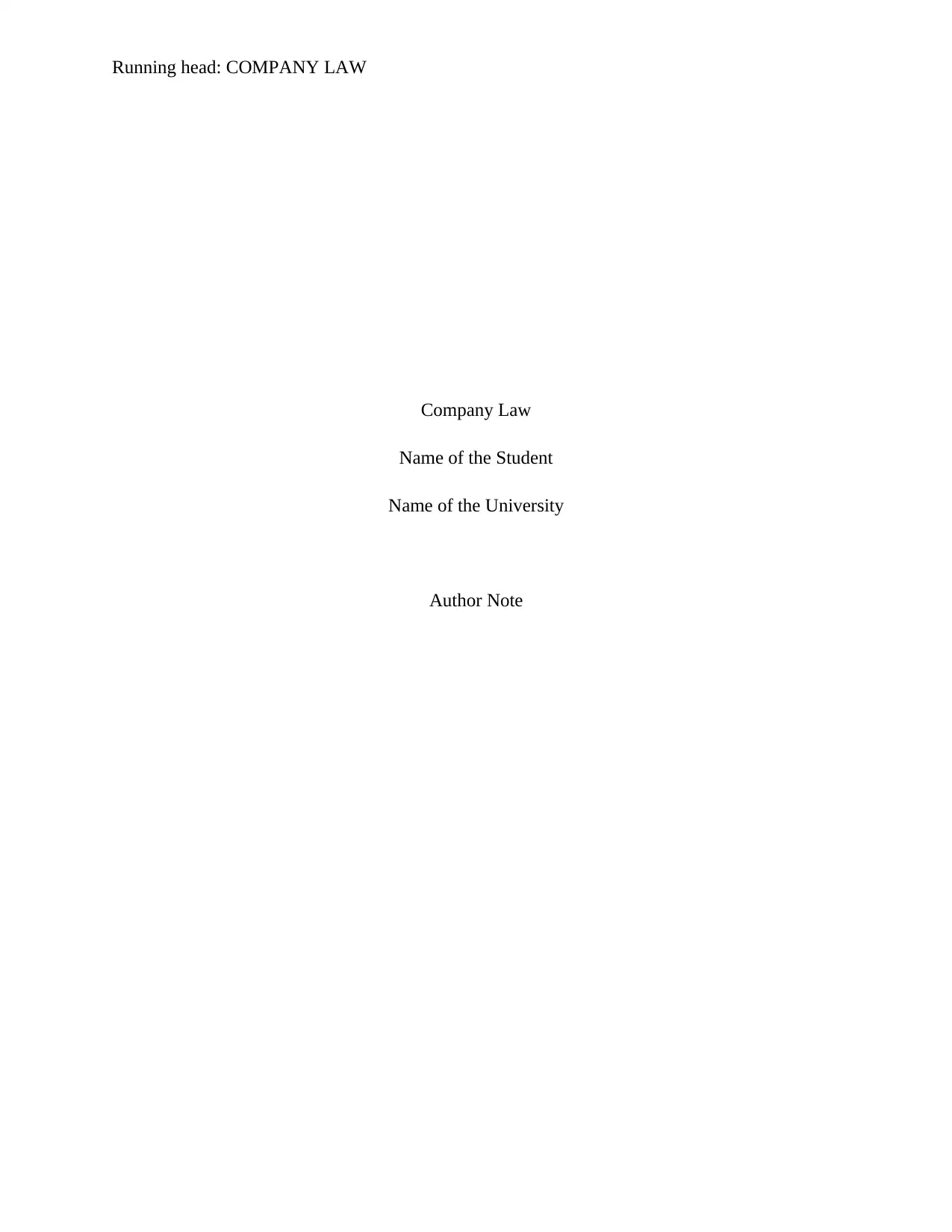
Running head: COMPANY LAW
Company Law
Name of the Student
Name of the University
Author Note
Company Law
Name of the Student
Name of the University
Author Note
Paraphrase This Document
Need a fresh take? Get an instant paraphrase of this document with our AI Paraphraser
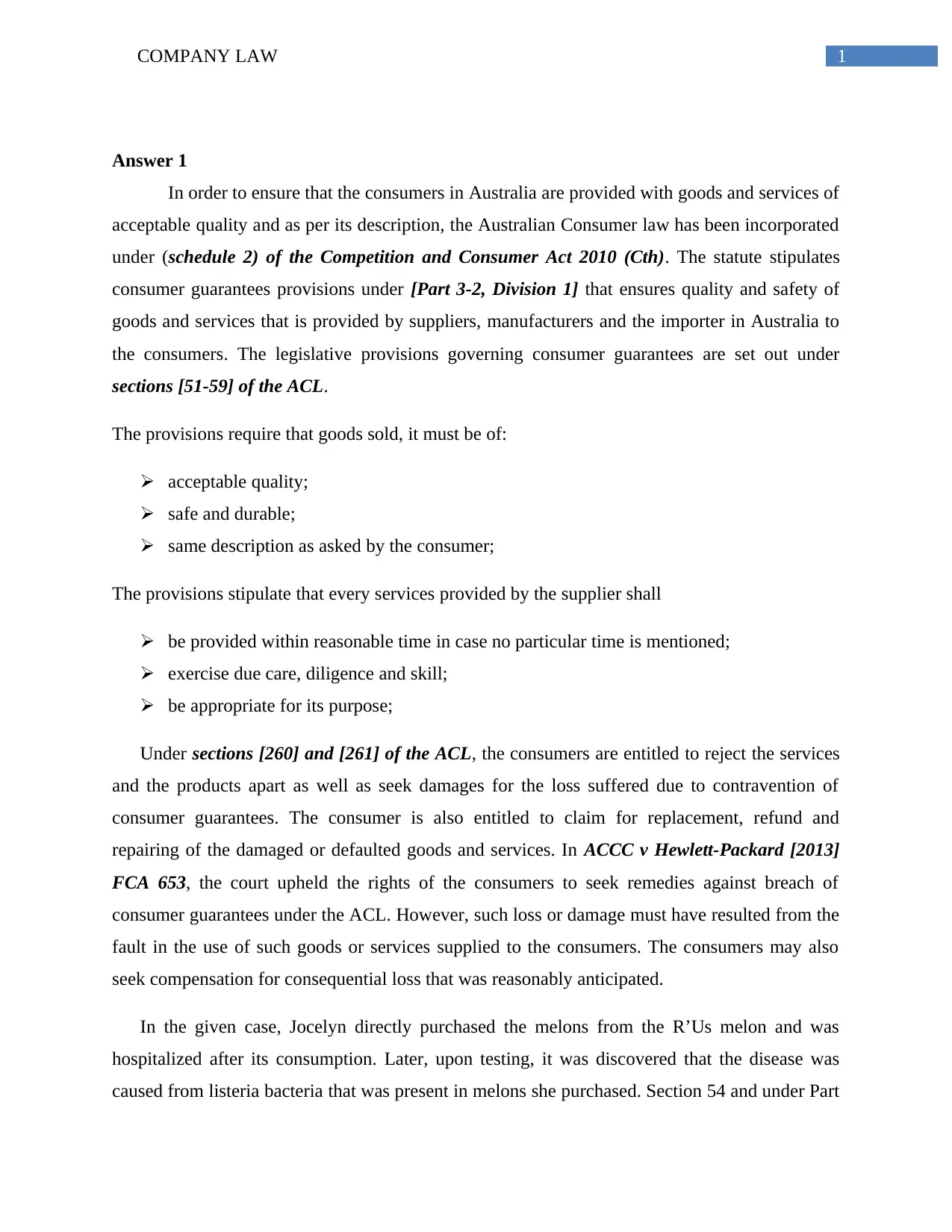
1COMPANY LAW
Answer 1
In order to ensure that the consumers in Australia are provided with goods and services of
acceptable quality and as per its description, the Australian Consumer law has been incorporated
under (schedule 2) of the Competition and Consumer Act 2010 (Cth). The statute stipulates
consumer guarantees provisions under [Part 3-2, Division 1] that ensures quality and safety of
goods and services that is provided by suppliers, manufacturers and the importer in Australia to
the consumers. The legislative provisions governing consumer guarantees are set out under
sections [51-59] of the ACL.
The provisions require that goods sold, it must be of:
acceptable quality;
safe and durable;
same description as asked by the consumer;
The provisions stipulate that every services provided by the supplier shall
be provided within reasonable time in case no particular time is mentioned;
exercise due care, diligence and skill;
be appropriate for its purpose;
Under sections [260] and [261] of the ACL, the consumers are entitled to reject the services
and the products apart as well as seek damages for the loss suffered due to contravention of
consumer guarantees. The consumer is also entitled to claim for replacement, refund and
repairing of the damaged or defaulted goods and services. In ACCC v Hewlett-Packard [2013]
FCA 653, the court upheld the rights of the consumers to seek remedies against breach of
consumer guarantees under the ACL. However, such loss or damage must have resulted from the
fault in the use of such goods or services supplied to the consumers. The consumers may also
seek compensation for consequential loss that was reasonably anticipated.
In the given case, Jocelyn directly purchased the melons from the R’Us melon and was
hospitalized after its consumption. Later, upon testing, it was discovered that the disease was
caused from listeria bacteria that was present in melons she purchased. Section 54 and under Part
Answer 1
In order to ensure that the consumers in Australia are provided with goods and services of
acceptable quality and as per its description, the Australian Consumer law has been incorporated
under (schedule 2) of the Competition and Consumer Act 2010 (Cth). The statute stipulates
consumer guarantees provisions under [Part 3-2, Division 1] that ensures quality and safety of
goods and services that is provided by suppliers, manufacturers and the importer in Australia to
the consumers. The legislative provisions governing consumer guarantees are set out under
sections [51-59] of the ACL.
The provisions require that goods sold, it must be of:
acceptable quality;
safe and durable;
same description as asked by the consumer;
The provisions stipulate that every services provided by the supplier shall
be provided within reasonable time in case no particular time is mentioned;
exercise due care, diligence and skill;
be appropriate for its purpose;
Under sections [260] and [261] of the ACL, the consumers are entitled to reject the services
and the products apart as well as seek damages for the loss suffered due to contravention of
consumer guarantees. The consumer is also entitled to claim for replacement, refund and
repairing of the damaged or defaulted goods and services. In ACCC v Hewlett-Packard [2013]
FCA 653, the court upheld the rights of the consumers to seek remedies against breach of
consumer guarantees under the ACL. However, such loss or damage must have resulted from the
fault in the use of such goods or services supplied to the consumers. The consumers may also
seek compensation for consequential loss that was reasonably anticipated.
In the given case, Jocelyn directly purchased the melons from the R’Us melon and was
hospitalized after its consumption. Later, upon testing, it was discovered that the disease was
caused from listeria bacteria that was present in melons she purchased. Section 54 and under Part
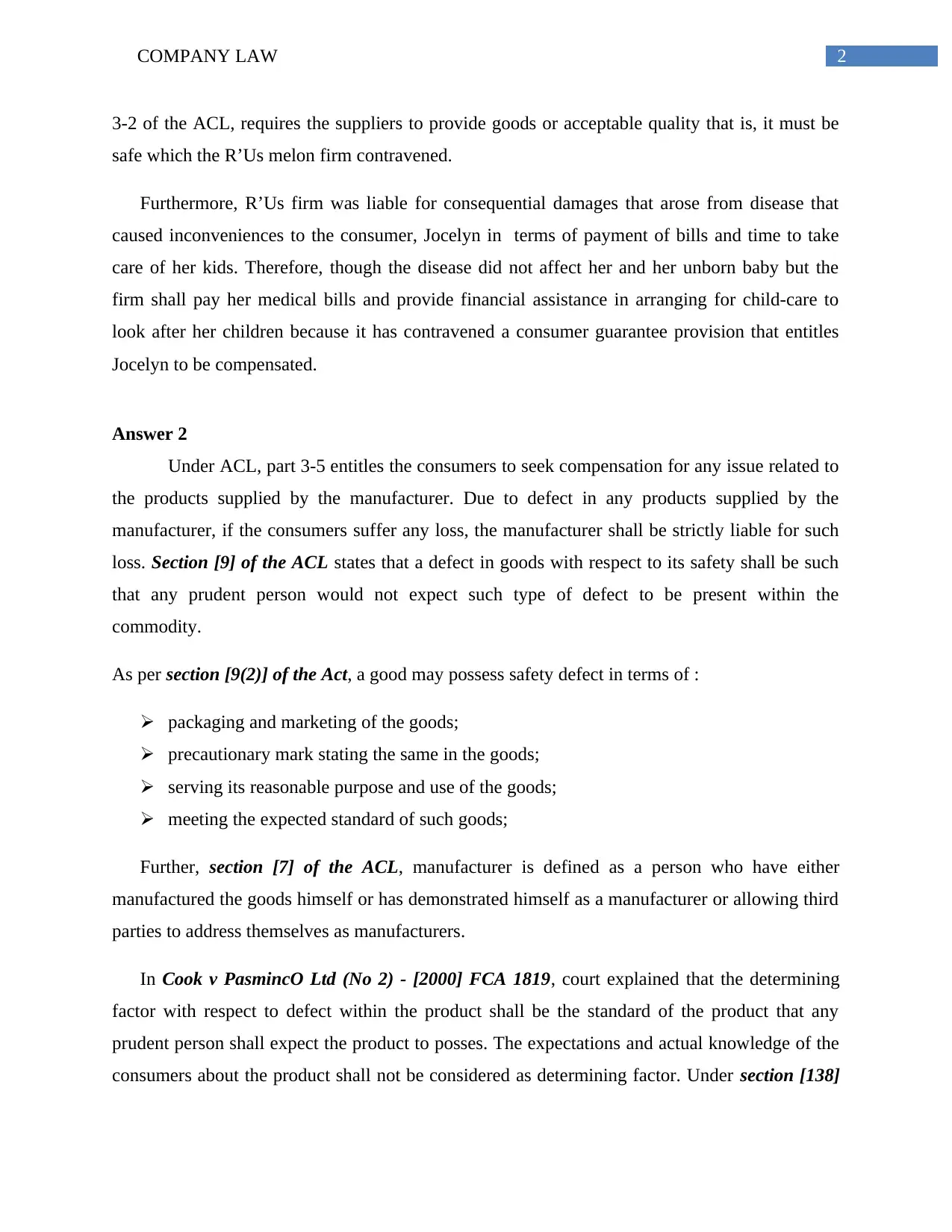
2COMPANY LAW
3-2 of the ACL, requires the suppliers to provide goods or acceptable quality that is, it must be
safe which the R’Us melon firm contravened.
Furthermore, R’Us firm was liable for consequential damages that arose from disease that
caused inconveniences to the consumer, Jocelyn in terms of payment of bills and time to take
care of her kids. Therefore, though the disease did not affect her and her unborn baby but the
firm shall pay her medical bills and provide financial assistance in arranging for child-care to
look after her children because it has contravened a consumer guarantee provision that entitles
Jocelyn to be compensated.
Answer 2
Under ACL, part 3-5 entitles the consumers to seek compensation for any issue related to
the products supplied by the manufacturer. Due to defect in any products supplied by the
manufacturer, if the consumers suffer any loss, the manufacturer shall be strictly liable for such
loss. Section [9] of the ACL states that a defect in goods with respect to its safety shall be such
that any prudent person would not expect such type of defect to be present within the
commodity.
As per section [9(2)] of the Act, a good may possess safety defect in terms of :
packaging and marketing of the goods;
precautionary mark stating the same in the goods;
serving its reasonable purpose and use of the goods;
meeting the expected standard of such goods;
Further, section [7] of the ACL, manufacturer is defined as a person who have either
manufactured the goods himself or has demonstrated himself as a manufacturer or allowing third
parties to address themselves as manufacturers.
In Cook v PasmincO Ltd (No 2) - [2000] FCA 1819, court explained that the determining
factor with respect to defect within the product shall be the standard of the product that any
prudent person shall expect the product to posses. The expectations and actual knowledge of the
consumers about the product shall not be considered as determining factor. Under section [138]
3-2 of the ACL, requires the suppliers to provide goods or acceptable quality that is, it must be
safe which the R’Us melon firm contravened.
Furthermore, R’Us firm was liable for consequential damages that arose from disease that
caused inconveniences to the consumer, Jocelyn in terms of payment of bills and time to take
care of her kids. Therefore, though the disease did not affect her and her unborn baby but the
firm shall pay her medical bills and provide financial assistance in arranging for child-care to
look after her children because it has contravened a consumer guarantee provision that entitles
Jocelyn to be compensated.
Answer 2
Under ACL, part 3-5 entitles the consumers to seek compensation for any issue related to
the products supplied by the manufacturer. Due to defect in any products supplied by the
manufacturer, if the consumers suffer any loss, the manufacturer shall be strictly liable for such
loss. Section [9] of the ACL states that a defect in goods with respect to its safety shall be such
that any prudent person would not expect such type of defect to be present within the
commodity.
As per section [9(2)] of the Act, a good may possess safety defect in terms of :
packaging and marketing of the goods;
precautionary mark stating the same in the goods;
serving its reasonable purpose and use of the goods;
meeting the expected standard of such goods;
Further, section [7] of the ACL, manufacturer is defined as a person who have either
manufactured the goods himself or has demonstrated himself as a manufacturer or allowing third
parties to address themselves as manufacturers.
In Cook v PasmincO Ltd (No 2) - [2000] FCA 1819, court explained that the determining
factor with respect to defect within the product shall be the standard of the product that any
prudent person shall expect the product to posses. The expectations and actual knowledge of the
consumers about the product shall not be considered as determining factor. Under section [138]
⊘ This is a preview!⊘
Do you want full access?
Subscribe today to unlock all pages.

Trusted by 1+ million students worldwide
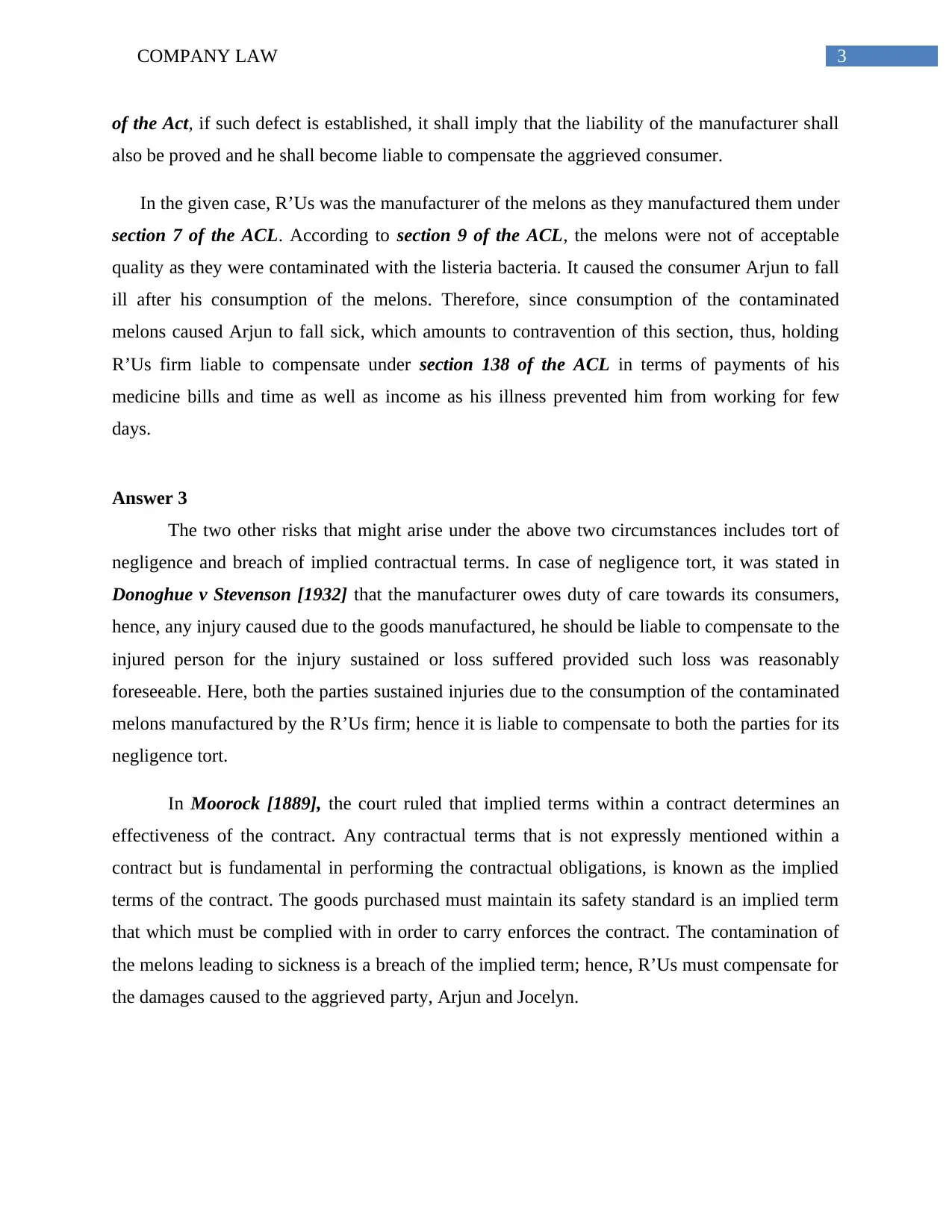
3COMPANY LAW
of the Act, if such defect is established, it shall imply that the liability of the manufacturer shall
also be proved and he shall become liable to compensate the aggrieved consumer.
In the given case, R’Us was the manufacturer of the melons as they manufactured them under
section 7 of the ACL. According to section 9 of the ACL, the melons were not of acceptable
quality as they were contaminated with the listeria bacteria. It caused the consumer Arjun to fall
ill after his consumption of the melons. Therefore, since consumption of the contaminated
melons caused Arjun to fall sick, which amounts to contravention of this section, thus, holding
R’Us firm liable to compensate under section 138 of the ACL in terms of payments of his
medicine bills and time as well as income as his illness prevented him from working for few
days.
Answer 3
The two other risks that might arise under the above two circumstances includes tort of
negligence and breach of implied contractual terms. In case of negligence tort, it was stated in
Donoghue v Stevenson [1932] that the manufacturer owes duty of care towards its consumers,
hence, any injury caused due to the goods manufactured, he should be liable to compensate to the
injured person for the injury sustained or loss suffered provided such loss was reasonably
foreseeable. Here, both the parties sustained injuries due to the consumption of the contaminated
melons manufactured by the R’Us firm; hence it is liable to compensate to both the parties for its
negligence tort.
In Moorock [1889], the court ruled that implied terms within a contract determines an
effectiveness of the contract. Any contractual terms that is not expressly mentioned within a
contract but is fundamental in performing the contractual obligations, is known as the implied
terms of the contract. The goods purchased must maintain its safety standard is an implied term
that which must be complied with in order to carry enforces the contract. The contamination of
the melons leading to sickness is a breach of the implied term; hence, R’Us must compensate for
the damages caused to the aggrieved party, Arjun and Jocelyn.
of the Act, if such defect is established, it shall imply that the liability of the manufacturer shall
also be proved and he shall become liable to compensate the aggrieved consumer.
In the given case, R’Us was the manufacturer of the melons as they manufactured them under
section 7 of the ACL. According to section 9 of the ACL, the melons were not of acceptable
quality as they were contaminated with the listeria bacteria. It caused the consumer Arjun to fall
ill after his consumption of the melons. Therefore, since consumption of the contaminated
melons caused Arjun to fall sick, which amounts to contravention of this section, thus, holding
R’Us firm liable to compensate under section 138 of the ACL in terms of payments of his
medicine bills and time as well as income as his illness prevented him from working for few
days.
Answer 3
The two other risks that might arise under the above two circumstances includes tort of
negligence and breach of implied contractual terms. In case of negligence tort, it was stated in
Donoghue v Stevenson [1932] that the manufacturer owes duty of care towards its consumers,
hence, any injury caused due to the goods manufactured, he should be liable to compensate to the
injured person for the injury sustained or loss suffered provided such loss was reasonably
foreseeable. Here, both the parties sustained injuries due to the consumption of the contaminated
melons manufactured by the R’Us firm; hence it is liable to compensate to both the parties for its
negligence tort.
In Moorock [1889], the court ruled that implied terms within a contract determines an
effectiveness of the contract. Any contractual terms that is not expressly mentioned within a
contract but is fundamental in performing the contractual obligations, is known as the implied
terms of the contract. The goods purchased must maintain its safety standard is an implied term
that which must be complied with in order to carry enforces the contract. The contamination of
the melons leading to sickness is a breach of the implied term; hence, R’Us must compensate for
the damages caused to the aggrieved party, Arjun and Jocelyn.
Paraphrase This Document
Need a fresh take? Get an instant paraphrase of this document with our AI Paraphraser
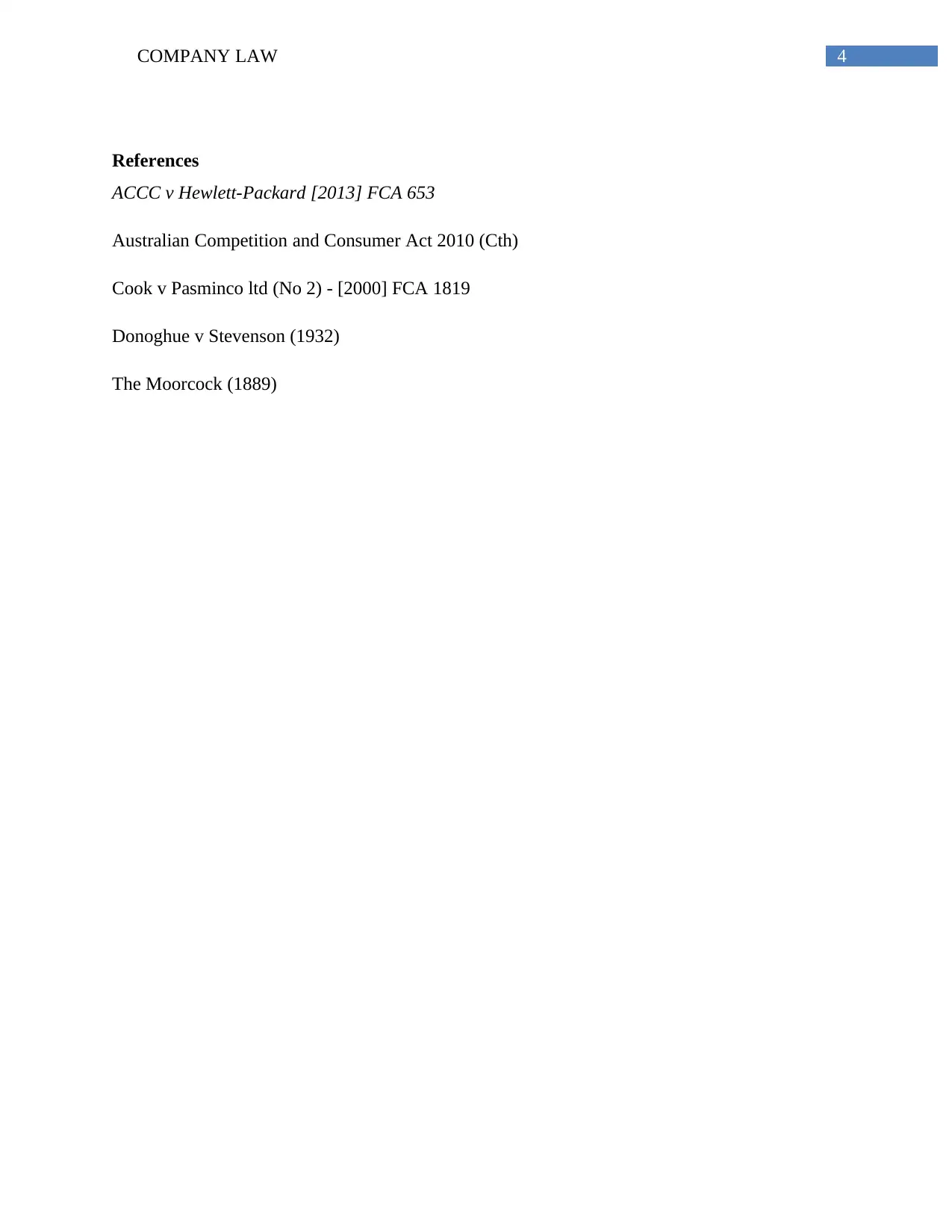
4COMPANY LAW
References
ACCC v Hewlett-Packard [2013] FCA 653
Australian Competition and Consumer Act 2010 (Cth)
Cook v Pasminco ltd (No 2) - [2000] FCA 1819
Donoghue v Stevenson (1932)
The Moorcock (1889)
References
ACCC v Hewlett-Packard [2013] FCA 653
Australian Competition and Consumer Act 2010 (Cth)
Cook v Pasminco ltd (No 2) - [2000] FCA 1819
Donoghue v Stevenson (1932)
The Moorcock (1889)
1 out of 5
Related Documents
Your All-in-One AI-Powered Toolkit for Academic Success.
+13062052269
info@desklib.com
Available 24*7 on WhatsApp / Email
![[object Object]](/_next/static/media/star-bottom.7253800d.svg)
Unlock your academic potential
Copyright © 2020–2026 A2Z Services. All Rights Reserved. Developed and managed by ZUCOL.





